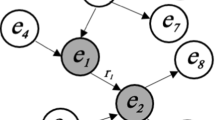Abstract
This paper presents and analyzes three fundamental problems in knowledge acquisition, and proposes a general method for tackling them. The method divides the whole process of knowledge acquisition into a set of almost independent pieces, each of which can be finished by knowledge engineers, experts and assistants, respectively.
Similar content being viewed by others
References
Cao Cungen. Conceptual knowledge acquisition: A multi-expert approach. InProc. Pacific RIM Conference on Artificial Intelligence, Vol. 1, pp. 467–472, 1994.
Johnson P. What kind of expert should a system be?J. Medical and Philosophy, 1983, 8: 77–97.
Laberge D. Attention and measurement of perceptual learning.Memory and Cognition, 1973, 1: 268–276.
Author information
Authors and Affiliations
Additional information
Cao Cungen received his Ph.D. degree in theoretical computer science from Institute of Mathematics, The Chinese Academy of Science in 1993. His research interests include AI, multiagent systems and Petri net.
Liu Wei received her M.S. degree in distributed database systems from Institute of Mathematics, The chinese Academy of Science in 1987. She is a lecturer of Department of Mathematics at Yunnan Normal University. Her main interests include knowledge engineering and database systems.
Rights and permissions
About this article
Cite this article
Cao, C., Liu, W. A three-stage knowledge acquisition method. J. of Compt. Sci. & Technol. 10, 274–280 (1995). https://doi.org/10.1007/BF02943495
Received:
Revised:
Issue Date:
DOI: https://doi.org/10.1007/BF02943495




